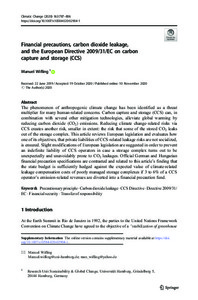Financial precautions, carbon dioxide leakage, and the European Directive 2009/31/EC on carbon capture and storage (CCS)

2020
163
2
787-806
precautionary principle ; carbon dioxide ; EU Directive ; responsibility ; climate change ; financial aspect
European Union
https://doi.org/10.1007/s10584-020-02904-1
English
Bibliogr.
"The phenomenon of anthropogenic climate change has been identified as a threat multiplier for many human-related concerns. Carbon capture and storage (CCS) can, in combination with several other mitigation technologies, alleviate global warming by reducing carbon dioxide (CO2) emissions. Reducing climate change-related risks via CCS creates another risk, smaller in extent: the risk that some of the stored CO2 leaks out of the storage complex. This article reviews European legislation and evaluates how one of its objectives, that private liabilities of CCS-related leakage risks are not socialized, is ensured. Slight modifications of European legislation are suggested in order to prevent an indefinite liability of CCS operators in case a storage complex turns out to be unexpectedly and unavoidably prone to CO2 leakages. Official German and Hungarian financial precaution specifications are contrasted and related to this article's finding that the state budget is sufficiently hedged against the expected value of climate-related leakage compensation costs of poorly managed storage complexes if 3 to 6% of a CCS operator's emission-related revenues are diverted into a financial precaution fund."
Digital
The ETUI is co-funded by the European Union. Views and opinions expressed are however those of the author(s) only and do not necessarily reflect those of the European Union or the ETUI.